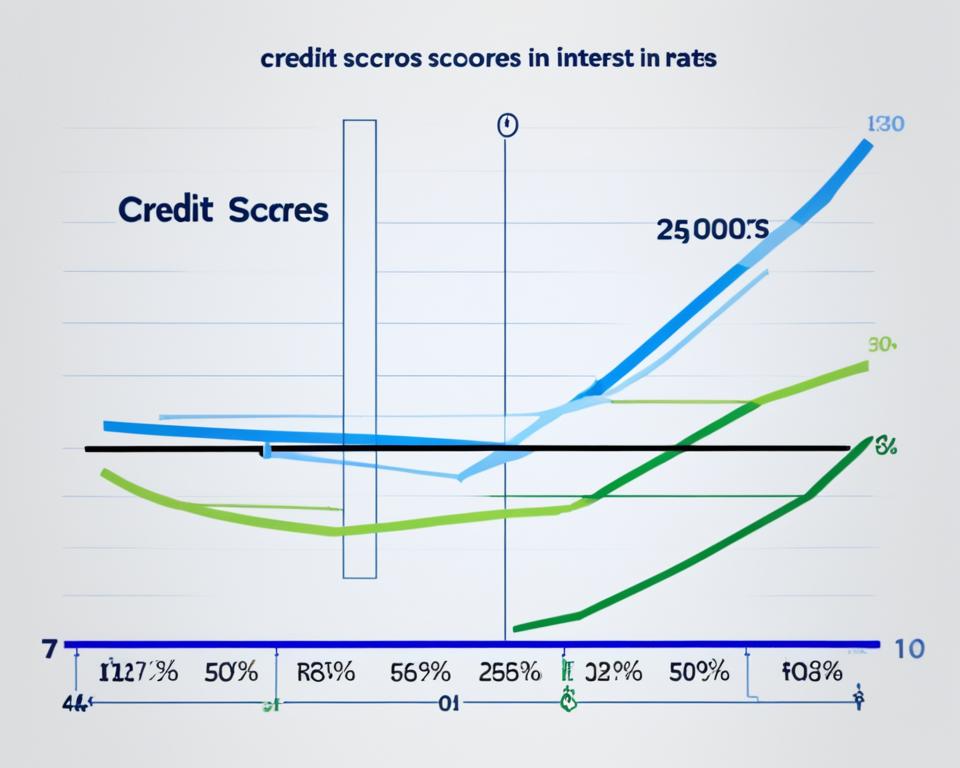The path to homeownership is seldom a straight line, particularly when it involves navigating the complexities of mortgage approval. At the core of every mortgage application and loan underwriting process is a small but mighty number: the credit score. This critical figure is paramount when assessing financial eligibility, acting as a quantifiable gauge of an individual’s financial reliability and influencing the ease at which one may secure a home loan. Understanding credit in mortgage transactions is not just recommended; it’s essential.
The crux of mortgage approval stems from evaluating the risk a lender takes when extending a financial hand to a prospective buyer. A high credit score signals a lesser risk, often yielding more favorable conditions for the borrower. In contrast, a lesser score may necessitate stricter loan conditions or even pose a hurdle in approval itself. Thus, recognizing the influence one’s credit score has is fundamental to a smooth mortgage journey.
Key Takeaways
- A credit score is integral in the mortgage approval process, influencing rates, terms, and accessibility of loans.
- Financial eligibility is closely linked to credit scores, as they encapsulate one’s creditworthiness at a glance.
- The loan underwriting process utilizes credit scores to determine the level of risk associated with lending to an individual.
- Proactive financial habits and vigilant credit management are key to improving credit scores ahead of a mortgage application.
- A better understanding of credit in mortgage procedures empowers prospective homeowners to leverage their financial history for optimal outcomes.
Credit Score: The Gateway to Mortgage Possibilities
The significance of your credit score in the mortgage approval journey cannot be understated, as it directly impacts your access to various mortgage possibilities. Lenders consider this three-digit number to be a crucial barometer of your financial health—a decisive factor that can either open doors or impose barriers in the quest for homeownership.
Why Lenders Prioritize Your Credit Score
Lenders scrutinize your credit score with a meticulous eye because it serves as an instant risk assessment tool. A credit history replete with timely payments, judicious credit management, and responsible debt handling reassures lenders of a potential borrower’s capability to repay the loan according to terms. In essence, a higher credit score betokens a safer bet for lenders, thus smoothing the loan approval process.
Understanding the Credit Score Spectrum
Credit scores range broadly, from the perilous lows around 300 to the laudable highness of 850. This spectrum embodies the financial journey of a borrower; where those at the higher end often experience a frictionless path filled with more agreeable mortgage possibilities, and those nearer the lower threshold may confront higher interest rates and stringent loan qualifications. It is a clear indicator that one’s credit score does not merely suggest, but vividly narrates, their credit reliability.
How a Good Credit Score Can Save You Money
Attaining lower interest rates is one of the prime benefits of having a good credit score. Over the lifespan of a mortgage, just a percentage point less in interest can culminate in savings that reach into the tens of thousands. This reality positions one’s credit score as not merely a hurdle to overcome during the mortgage acquisition but as a strategic financial lever that can yield long-term economic advantages. Improving your credit score is an investment—one that pays dividends in the realm of mortgage possibilities and beyond.
Unwrapping the Credit Score Mystery
Decoding the enigma of credit scores is like piecing together a financial puzzle. Each component — from payment history to credit utilization — plays a defining role in painting a picture of an individual’s creditworthiness. For lenders evaluating a mortgage application, these elements collectively offer a comprehensive credit report evaluation. It’s this all-encompassing review that informs the decision-making process and determines a borrower’s financial eligibility for a home loan. So what goes into this critical number? Let’s delve into the details.

A well-rounded credit score considers a variety of factors, each carrying a particular weight in the overall calculation. Understanding these can empower prospective homeowners to take actionable steps towards bolstering their financial standing. Here’s a snapshot:
| Credit Score Factor | Description | Why It Matters |
|---|---|---|
| Payment History | Record of on-time payments | Signals reliability in repaying debts |
| Credit Utilization | Amount of credit used versus credit available | Reflects debt management skills |
| Length of Credit History | Average age of one’s credit accounts | Indicates experience in handling credit |
| Types of Credit | Variety of credit accounts (e.g., loans, credit cards) | Demonstrates ability to manage diverse forms of credit |
| New Credit Inquiries | Frequency of applying for new credit | Can suggest financial stability or desperation |
Each aspect of a credit score serves as an individual thread in the larger tapestry of a person’s financial history. Grasping how these components influence one’s score is akin to unlocking a door to higher creditworthiness and, subsequently, more favorable loan terms. When it comes to securing funding for a vital investment like a home, one cannot overstate the importance of a robust credit score.
- **Payment History**: Ensuring timely bill payments can significantly improve one’s credit score.
- **Credit Utilization**: Maintaining a low balance relative to credit limits can demonstrate responsible credit usage.
- **Credit History**: A longer credit history provides more data, helping lenders assess risk more effectively.
- **Credit Mix**: A diversity of credit types shows that one can handle various financial responsibilities successfully.
- **New Credit**: Minimizing new credit applications helps avoid temporary dips in credit scores caused by hard inquiries.
The journey to improving one’s credit score is an intentional one. By focusing on these key elements and consistently managing them wisely, reaching the pinnacle of financial reliability — and thus clearing the path to mortgage approval — becomes an attainable goal.
Key Factors Affecting Your Credit Score
Delving into the intricacies of your credit score unveils its direct correlation with the potential success of a mortgage application. Certain credit score factors stand out as fundamental in gauging a borrower’s creditworthiness. These elements are not only central to calculating your credit score but also pivotal in a lender’s decision during the mortgage approval process.
The Impact of Payment History on Your Approval Chances
Payment history is the bedrock of your credit score, often being the most telling indicator of your likelihood to fulfill financial obligations on time. A consistent track record of punctual payments can substantially uplift your credit profile, showcasing you as a dependable borrower.
The Role of Credit Utilization on Financial Health
Credit utilization — the ratio of your credit card balances to your limits — plays a significant role in reflecting your financial health. Maintaining low credit utilization not only demonstrates your adeptness in managing debt but also can lead to an increase in your credit score.
The Significance of Credit History Length
The length of your credit history, which chronicles the duration of your dealings with credit, is an essential component. A longer credit history can afford lenders a more detailed perspective of your financial behaviors over time, influencing their confidence in your credit reliability.
Diversity of Credit and Its Influence on Your Score
Credit diversity — the mix of different types of credit accounts in your financial portfolio, like mortgages, auto loans, and credit cards — affects your credit score. This diversity underscores your ability to juggle various credit types, which can be favorable in the eyes of lenders.
| Credit Score Component | Influence on Credit Score | Reason for Importance |
|---|---|---|
| Payment History | High | Indicates a pattern of financial responsibility |
| Credit Utilization | Medium to High | Signifies a borrower’s debt management ability |
| Length of Credit History | Medium | Provides insight into the borrower’s credit experience |
| Credit Diversity | Low to Medium | Reflects handling capability of varied debt products |
In conclusion, understanding the elements that make up your credit score, including payment history, credit utilization, credit history length, and credit diversity, is essential. Taking proactive measures to optimize these factors can enhance your credit profile, making you a more desirable candidate for mortgage lenders.
Interest Rates and Your Credit Standing
For prospective homeowners, the quest for optimal mortgage terms often hinges on two interlocked elements: credit scores and interest rates. It’s a pivotal relationship that’s central to the loan approval process. To demystify this connection, it’s essential to understand that lenders view a borrower’s credit score as a direct symbol of their credit standing. This number essentially informs them of the level of risk involved in lending to each individual, and that evaluation significantly shapes the interest rates offered.

Lenders typically offer more attractive rates to those whose credit scores signify a strong credit standing. This is not merely a matter of lender preference; it reflects an intricate web of financial risk and reward. A robust credit score could result in interest rates that make a substantial difference in the total cost of a home loan.
To paint a clearer picture, let’s consider the following insights. A high credit score can often unlock interest rates that significantly lower the overall financial burden over the life of a loan. Remember, when it comes to mortgaging a property, even a fractional percentage drop in interest rates translates into a potentially significant monetary saving.
| Credit Score Range | Typical Interest Rates | Lifetime Cost Implications on $300,000 Mortgage |
|---|---|---|
| 760+ | Excellent Rates | Minimum Interest Paid |
| 700 – 759 | Good Rates | Moderate Interest Paid |
| 620 – 699 | Fair Rates | Higher Interest Paid |
| Below 620 | Elevated Rates | Maximum Interest Paid |
Thus, the importance of maintaining a high credit score cannot be overstated. Not only does it influence your credit standing, but it also shapes the realm of possibilities with regards to loan approval and beneficial interest rates. Nurturing one’s credit score is a vital step toward securing a mortgage that aligns with one’s financial aspirations and homeownership goals.
- A higher credit score enhances your bargaining power for reduced interest rates.
- Maintaining fiscal discipline improves credit standing and bolsters the case for loan approval.
- An informed borrower can negotiate mortgage terms utilizing their robust credit score as leverage.
By addressing these components and refining one’s credit health, future homeowners can uncover the most cost-effective paths to achieving their dreams of owning a house.
The Role of Credit in Mortgage Approval
In the world of home financing, the role of credit stands out as a pivotal facet of the mortgage approval process. A credit score, that powerful three-digit number, directly influences the gamut of loan conditions you’re likely to encounter. This metric showcases an individual’s creditworthiness, etching a profile of financial trustworthiness that lenders assess with keen interest.
Undoubtedly, a robust credit score lays the groundwork for a persuasive mortgage application. It convinces lenders of a prospective homebuyer’s capacity to honor their debt. Let’s explore how a credit score impacts the various components of mortgage financing:
Firstly, the interest rates one might secure are deeply entwined with their credit score. The higher this score, the lower the interest rates offered, which can translate to considerable savings over the lifetime of the mortgage.
| Credit Score | Potential Loan Conditions |
|---|---|
| Excellent (720+) | Lower interest rates, more favorable terms |
| Good (690-719) | Competitive interest rates with standard terms |
| Fair (630-689) | Possible higher interest rates and stricter conditions |
| Poor (Below 630) | High interest rates and limited loan options |
Furthermore, terms like the loan amount and required down payment also vacillate based on one’s credit score. Achieving a noteworthy credit score may unlock access to larger loan amounts and more relaxed down payment requirements, thus broadening one’s real estate choices.
While it’s clear that a credit score is central to the mortgage landscape, how does one ensure that their score is in good standing? Productive habits include prompt bill payments, maintaining low credit utilization, and careful management of credit types. These practices help foster a history of financial discipline, something that resonates positively with lenders.
Seasoned and first-time homebuyers alike should be aware of the role of credit as they embark on securing a mortgage. A respectable credit score can ease the journey towards homeownership, making it a dream realized with fewer fiscal roadblocks and more advantageous loan conditions.
Mortgage Application Success: Boosting Your Creditworthiness
Stepping onto the property ladder is an aspirational goal for many, yet the intricacies of a mortgage application can pose significant challenges. Central to navigating this process is the concept of creditworthiness—a measure of your reliability as a borrower and a cornerstone in the foundation of mortgage application success. To enhance your appeal to lenders, a multidimensional approach to credit improvement is required, underpinned by financial habits that herald both responsibility and prudence.
Improving your credit score is an actionable testament to your creditworthiness. Regular oversight of your credit report plays a crucial role, as it allows for the swift identification and rectification of any discrepancies that may unfairly mar your credit history. This vigilance is a proactive step towards ensuring that your financial portrait is both accurate and polished, mirroring the integrity of your financial conduct.
Consistency in managing debts effectively frames your fiscal persona. Timely bill payments are not merely a routine transaction but a profound statement of your reliability, which resonates with potential lenders. A healthy credit score is a reflection of this steadfastness, counting in your favor when every percentage point in your credit report counts.
Another strategic maneuver in credit improvement involves managing credit utilization. Efficacious debt repayment not only alleviates your fiscal burdens but also improves your credit utility ratio—a metric that lenders scrutinize. It conveys to creditors that you are capable of judiciously managing your existing credit without reliance on overextension.
An often-overlooked factor that can bolster your credit score is the judicious application for new credit. While new lines of credit can diversify your portfolio, indiscriminate credit inquiries can trigger a dip in your score. It is vital to approach new credit with a strategic mindset, ensuring that each application serves a concrete purpose and contributes positively to your overall financial habits.
- Review Credit Reports: Routinely check your credit reports from trustworthy bureaus for accuracy.
- On-time Payments: Prioritize punctual payments to build a history of reliability.
- Lower Credit Utilization: Aim to reduce outstanding debts, keeping credit balances well below limits.
- Prudent Credit Applications: Approach new credit applications selectively to prevent unnecessary hard inquiries.
By embracing these methodologies, you pave the way towards amplifying your creditworthiness. Such financial sagacity not only elevates your credit score but also enriches your eligibility for mortgage approval. As you hone these financial habits, remember that the journey to refining your credit profile is a testament to your fiscal foresight—a quality that prospective lenders esteem highly in the realm of real estate finance.
Navigating Loan Terms through the Lens of Credit
Embarking on the journey to homeownership, individuals find the path often dictated by their credit standing. Good credit is the cornerstone of favorable loan conditions, shaping the mortgage landscape to the borrower’s advantage. It’s the intricate details within one’s credit report that lenders scrutinize to determine mortgage terms, impacting factors such as Private Mortgage Insurance (PMI) costs and down payment requirements.
How Good Credit Translates to Favorable Loan Conditions
In the realm of mortgage financing, having good credit can vastly improve the terms of a loan. Those boasting higher credit scores are typically rewarded with lower interest rates, potentially saving thousands in the long run. Navigating loan terms with a commendable credit background means accessing a variety of borrowing conditions, some of which can drastically alleviate the financial pressures of a loan.
But the benefits extend beyond interest rates. Good credit unlocks a suite of preferential features including the possibility of smaller down payments and reduced or even waived PMI fees. In short, the better the credit, the more negotiable the loan becomes.
Understanding PMI and Down Payments for Different Credit Tiers
When diving deeper into the mortgage process, understanding the implications of PMI and down payments becomes pivotal. These terms directly correlate with the creditworthiness displayed by borrowers. PMI, an insurance that lenders require to mitigate risk in case of default, can be minimized with the leverage of high credit scores. Meanwhile, down payments – the initial lump sum payment toward the home purchase – can often be lowered if the credit report reflects responsible financial behavior. This demonstrates the tangible importance of a strong credit report that can ease the financial burden associated with procuring a home.
| Credit Score Range | Estimated PMI Rates | Typical Down Payment Percentage |
|---|---|---|
| 740+ | Minimal or None | 5-10% |
| 700-739 | Reduced | 10-15% |
| 660-699 | Standard | 15-20% |
| 620-659 | Increased | 20-25% |
| Considerable | 25%+ |
As tabled above, the threshold of credit scores plays a definitive role in shaping the navigating loan terms experience for homebuyers. Inculcating habits that cultivate high credit scores thus not only positions individuals more favorably in the eyes of lenders but unlocks access to more advantageous loan terms. It establishes the foundation upon which borrowers can minimize costs and maximize their investment in homeownership.
Strategies to Elevate Your Credit Score Before Applying
Securing a mortgage hinges on a robust credit score, the linchpin of financial credibility. Prior to embarking on the mortgage application process, it’s strategic to initiate steps designed to elevate your credit score. Anticipatory measures such as regular credit report check-ups, diligent bill payments, and purposeful debt reduction can significantly bolster credit health. Carefully managing credit inquiries also plays an integral role in maintaining a credit score conducive to mortgage approval.

Regular Credit Report Check-Ups: The Foundation of Score Improvement
Regularly scheduled credit report check-ups serve as the cornerstone for improving and maintaining a favorable credit score. Each year, individuals are entitled to a free credit report from each of the three major bureaus Experian, Equifax, and TransUnion. Proactively reviewing credit reports enables individuals to identify and swiftly address any inaccuracies or instances of identity theft, both of which can unjustifiably impair one’s credit score.
Best Practices for Bill Payments and Debt Reduction
Consistency in bill payments showcases financial reliability, making it paramount for anyone looking to elevate their credit score. Timely payments contribute positively to credit reports, affirming a pattern of fiscal dependability pivotal in lending decisions. Coupled with strategic debt reduction, which lowers one’s credit utilization ratio, this practice fortifies the foundation for a credit score ascent. A lower ratio is frequently perceived as a sign of responsible credit use and can lead to a commendable increase in your credit score.
Smart Moves: The Impact of New Credit Inquiries
New credit inquiries, while sometimes necessary, should be approached with tactful consideration. Each application can potentially initiate a hard inquiry, which may temporarily dent your credit score. It’s vital to exercise discretion when soliciting new credit lines; limiting applications to those that are essential, bears testament to a well-calculated approach to credit management.
| Action | Effect on Credit Score | Best Practice |
|---|---|---|
| Credit Report Check-Ups | Potential to Identify and Correct Errors | Annually, from each major bureau |
| Bill Payments | Builds Payment History | Timely Payments; Automate to Avoid Lateness |
| Debt Reduction | Lowers Credit Utilization Ratio | Pay Down Balances; Keep Utilization under 30% |
| Credit Inquiries | May Lower Score if Excessive | Apply for New Credit Sparingly |
To fortify your mortgage application and amplify your eligibility, aligning with these strategies to elevate your credit score is imperative. Such preparation is not only an act of financial wisdom but a lever to potentially unlock more advantageous mortgage options.
Credit Score Variations and Mortgage Eligibility
As you embark on the journey of homebuying, understanding the dynamics of credit score variations is instrumental for assessing mortgage eligibility. Just as a landscape offers different terrains, the mortgage landscape presents a variety of scenarios for borrowers, which are often contingent upon their credit scores. Recognizing the spectrum of credit score ranges and their implications can be a decisive factor in one’s financial planning strategies and success in home financing.
When it comes to the loan underwriting process, lenders evaluate credit score ranges as a standard part of assessing a borrower’s risk profile. Such thorough examinations often dictate the terms and conditions of the potential loan. Borrowers who exhibit higher credit scores can typically expect more attractive rates and terms, signifying an advanced standing in financial reliability.
Those situated towards the lower end of the credit score continuum may encounter varied challenges. These include, but are not limited to, higher interest rates and a possible limitation on the mortgage programs for which they qualify. To illustrate these differences, consider the following table which aligns credit score variations with loan underwriting outcomes.
| Credit Score Range | Interest Rate Expectation | Loan Condition Probabilities |
|---|---|---|
| Excellent (720+) | Lower Rates | Primes borrower for favorable conditions and an expansive choice of programs |
| Good (690-719) | Competitive Rates | Provides access to majority standard mortgage programs with reasonable terms |
| Fair (630-689) | Slightly Elevated Rates | May require additional scrutiny from lenders and could limit program eligibility |
| Poor (Below 630) | Higher Rates | Higher likelihood of restrictive terms and reduced program options |
These credit score variations thus form a fair part of the foundation of financial planning for those in pursuit of a mortgage. It is a critical exercise to understand where you stand on this spectrum and to identify any potential pitfalls or peaks in your financial profile. Acknowledging your credit score range is just the starting point; from here, strategies can be drafted to enhance your mortgage eligibility profile.
Ultimately, by taking preemptive steps in one’s financial planning journey, prospective homeowners may significantly influence their path to acquiring a home. These measures may include rigorous debt management, consistent and timely payments, and avoidance of new credit inquiries leading up to the mortgage application. Solidifying one’s credit score is essentially solidifying one’s path to home loan approval.
- Prospective homeowners should actively monitor and enhance their credit scores as part of essential financial planning.
- Mortgage eligibility is often directly correlated with one’s credit score, influencing loan underwriting decisions.
- Better credit score variations can lead to more favorable lending terms, amplifying the importance of effective financial strategies.
Alternative Approaches for Applicants with Lower Credit Scores
Confronting the mortgage market with a lower credit score can seem daunting, but alternative avenues exist to facilitate homeownership despite less-than-ideal credit histories. Applicants who face challenges with conventional lending criteria often find solace in less traditional methods and government assistance that accommodate their unique financial situations.
Non-Traditional Lending and Government-Backed Loans
Non-traditional lending options offer a beacon of hope for those grappling with lower credit scores. These lenders typically operate outside the realm of traditional banks, potentially offering more flexible approval criteria. Moreover, government-backed loans provide structured support, recognizing that homeownership is a keystone of financial health and community stability. Programs such as the Federal Housing Administration (FHA) loans and Veterans Affairs (VA) loans are popular choices for their forgiving credit score requisites. This assistance underscores the government’s commitment to making homeownership accessible, regardless of past financial hurdles.
Levelling Your Mortgage Ground with Higher Down Payments
A well-considered strategy for applicants with lower credit scores is to proactively increase their down payments. This move signals to lenders a tangible commitment to the property and a reduced lending risk. Higher down payments can counterbalance the implications of a lower credit score, improving the odds of loan approval and potentially even resulting in more favorable loan terms.
| Loan Type | Typical Credit Score Requirements | Down Payment Expectations |
|---|---|---|
| FHA Loan | 500 with 10% down 580 with 3.5% down |
3.5-10% |
| VA Loan | No minimum by program, but lenders may set limits |
0% (No down payment required) |
| Alternative Lenders | Varies, often more flexible than traditional banks | Varies, typically higher to offset credit risk |
The ability to leverage alternative lending and government-backed loan programs offers a pathway to homeownership for those with past credit challenges. By familiarizing themselves with these options and possibly boosting their upfront financial commitment, applicants with lower credit scores can achieve the dream of owning a home.

Building a More Comprehensive Financial Profile Beyond Credit Scores
While credit scores play a central role in the decision-making process of lenders, they are only one component of a comprehensive financial profile. To truly gauge a borrower’s ability to sustain a mortgage, lenders must consider a broader spectrum of financial indicators. The debt-to-income ratio (DTI), for example, is a vital metric that calculates a borrower’s monthly debt payments against their gross monthly income. A lower DTI often implies a greater ability to manage monthly payments and thus, improves loan approval prospects.
But the analysis doesn’t end there. Savings and assets indicate a borrower’s capacity to handle unexpected expenses and financial resilience, factors which significantly enhance creditworthiness. Stable employment and income history offer assurances of ongoing repayment ability, aspects keenly observed by lenders. When these pieces come together, they form a comprehensive financial profile that can provide a more holistic understanding of a borrower’s financial position.
In the ever-evolving landscape of mortgage lending, borrowers who illustrate a robust financial health profile can find themselves in favorable standings for loan approval. Here’s a breakdown of the essential components beyond credit scores that contribute to an in-depth financial profile:
| Financial Aspect | Why It’s Important |
|---|---|
| Debt-to-Income Ratio | A lower ratio suggests better financial control and an increased ability to take on a mortgage. |
| Savings and Assets | Demonstrates fiscal responsibility and the capacity for handling financial emergencies. |
| Stable Employment | Consistent income reassures lenders of continued loan repayment capability. |
| Income History | Long-term employment stability indicates reliability and predicts future income security. |
The path towards securing a mortgage is as comprehensive as it is personalized. Buyers are judged not just by their credit scores but by their overall financial behaviors. Responsible credit use, healthy DTI ratios, ample savings, and stable income streams all contribute to a financial narrative that lenders can trust. This all-inclusive viewpoint aligns perfectly with Christopher Valencia’s insights on the mortgage approval process, advocating for a multi-faceted approach to financial health.
- Review and optimize your debt-to-income ratio to demonstrate financial balance.
- Accentuate the importance of building and maintaining robust savings and investment portfolios.
- Garner and provide evidence of stable, continuous employment and income growth over time.
At the end of the day, credit scores are an important indicator of financial health, but they are not the be-all and end-all. Bolstering your overall financial standing with a mindful eye on these various factors can significantly increase your chances for mortgage approval, proving to lenders that you’re more than just a number.
Conclusion
Embarking on the journey of homeownership, particularly the acquisition of a mortgage, is a testament to one’s financial readiness. While the significance of a credit score is indisputable, its preeminence is only the prologue to a broader financial narrative. As we’ve explored throughout this discussion, preparing for a mortgage requires an attentive look at the mosaic of one’s fiscal health. It goes beyond the confinements of a single number, opening up a ledger where every entry—debt management, savings, and credit habits—tells a part of your financial story.
Why Your Credit Score Is Just the Beginning
Indeed, a commendable credit score serves as a critical stepping stone, a quantifiable introduction to your financial persona. But as loan officers and financial advisors would concur, the tapestry of fiscal stability is woven with varied threads. The comprehensive scrutiny by lenders of your financial behaviors moves the dialogue forward from credit score significance to evaluating your adeptness at handling long-term financial commitments. This holistic assessment is essential in forging a path toward responsible and sustainable homeownership, and is a focal point for those who assist you in this process.
Preparing for a Mortgage: The Bigger Financial Picture
Preparing for a mortgage, therefore, is as much about improving your credit score as it is about cultivating a robust financial ecosystem. The presence of a substantial emergency fund, a solid debt-to-income ratio, and a trail of consistent saving habits fortifies your position as a borrower. Potential homebuyers, by attending to this bigger financial picture, can not only seize the opportunity to obtain a mortgage but also position themselves for a future of fiscal security. This preparation is a cornerstone in the construction of the American dream—a home of one’s own, achieved not impulsively, but with deliberate financial prudence and readiness.
FAQ
What role does credit play in the mortgage approval process?
Credit plays a pivotal role in mortgage approval, influencing both the interest rates offered and the overall eligibility of an applicant. Lenders use credit scores to assess a borrower’s financial responsibility, reliability, and the likelihood of repaying the loan on time.
Why do lenders prioritize your credit score during mortgage applications?
Lenders prioritize credit scores because they provide a quick, standardized measure of a borrower’s credit risk. High credit scores usually indicate a history of responsible credit management, predicting lower risks for lenders and often leading to more favorable loan terms for borrowers.
How does a good credit score save you money when obtaining a mortgage?
A good credit score can save you money by securing lower interest rates, which translates into lower monthly payments and less interest paid over the life of the loan. This can amount to substantial savings throughout the term of a mortgage.
What key factors impact my credit score?
Key factors that impact your credit score include your payment history, credit utilization, the length of your credit history, the types of credit accounts you have, and the number of recent credit inquiries.
How can I improve my creditworthiness before applying for a mortgage?
You can improve your creditworthiness by regularly checking your credit report for inaccuracies, making timely payments, reducing your credit utilization ratio, limiting new credit applications, and diversifying the types of credit you use.
What are the benefits of having good credit when negotiating loan terms?
Good credit often results in more favorable loan terms, such as lower interest rates, potentially smaller down payment requirements, and reduced private mortgage insurance costs. This can make homeownership more accessible and affordable.
Are there options for mortgage applicants with lower credit scores?
Yes, applicants with lower credit scores may still have options through non-traditional lenders or government-backed loans such as FHA and VA loans which generally have more lenient credit requirements. They could also offer higher down payments to improve the attractiveness of their mortgage application.
How does my credit score affect the interest rates I am offered?
Your credit score can have a direct effect on the interest rates you’re offered, as lenders often reserve lower interest rates for borrowers with higher credit scores. This reflects the lower risk they associate with lending to individuals with strong credit histories.
Is credit score the only determinant in mortgage approvals?
No, while important, the credit score is not the sole determinant. Other factors such as debt-to-income ratio, employment history, savings, and other financial obligations are also considered during the mortgage approval process to build a comprehensive view of the applicant’s financial health.
What strategies can I use to elevate my credit score before applying for a mortgage?
To improve your credit score, start with checking your credit report for errors and addressing any discrepancies. Consistently pay your bills on time, work toward reducing your debts, particularly high credit card balances, and avoid taking on new lines of credit that could lead to hard inquiries on your report.
How do I build a comprehensive financial profile beyond my credit score?
To build a comprehensive financial profile, focus on maintaining a healthy debt-to-income ratio, saving for a robust down payment, establishing an emergency fund, demonstrating stable employment, and managing existing debts effectively.
Can higher down payments counteract a lower credit score?
Yes, offering a larger down payment can sometimes offset a lower credit score. It reduces the lender’s risk by decreasing the loan-to-value ratio and can result in better loan terms or increased likelihood of loan approval.





